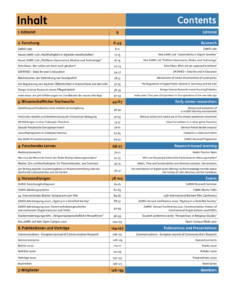
ZeMKI Research Report 2020/2021
Many say that 2020/21 was a year of many changes – driven by the Covid-19 pandemic. We do not want to claim that Corona had no consequences at ZeMKI, but . However, the truly game-changing experiences for the institution were others.
A first major change concerns the names that appear under this editorial: There was a change in the spokesperson:in collective of the ZeMKI, in that Kerstin Rade-Antweiler was elected by the general meeting as the second spokesperson. There were also extensive changes in the lab structure of the ZeMKI: Yannis Theocharis left the ZeMKI for the Technical University of Munich, where he returned to political science and now holds a professorship for digital governance. His professorship is currently in the process of being filled. Two other procedures have been completed, namely that of the professorships in Communication and Media Studies with a focus on Media Society and with a focus on Media Governance and Platform Economy. We can thus welcome Sigrid Kannengießer as the new Head of Lab and Christian Katzenbach as the new Head of Lab at the ZeMKI. Both labs are presented in detail on the following pages. A sad turning point last year was the sudden death of Marco Höhn, who was sustainably involved in media practice and transfer and leaves a big gap. We commemorate him in this research report with a contribution from the Kolleg:innen.
With all these changes – or because of them? – all ZeMKIs worked on the medium-term research strategy last year. It was a matter of sounding out what we want to focus on in joint research over the next five years and which individual projects everyone wants to advance. The medium-term research strategy now has to be discussed with the Advisory Council at the end of this year and hopefully we will be able to say more in our next research report.
Another nice change was the start of the doctoral program, which is the responsibility of Cornelius Puschmann and supervised by Miira Hill. We have not only agreed on structures here, but also on common standards, including the separation of supervision and peer review. More information on the program can be found in an article in this report.
But we would be lying if we didn’t say that Corona did lead to some changes at the ZeMKI. Unfortunately, due to the pandemic in 2020, our international meeting had to be postponed, as well as many workshops moved to the online format. We also had to suspend our international ZeMKI Fellows program. All fellows could either be at the ZeMKI virtually, but most decided to postpone their stay. And so things are just starting up again “for real”: we can not only welcome our students back in presence for WiSe 2021/22, but also our first research guests. The corridors are filling up again, just as the first parties are rising.
On the subject of “corridor”, something else comes to mind for all ZeMKIs for 2021, where Corona proved to be a stroke of luck: On 17 February, not only the entire front corridor but also quite a few offices were suddenly under water after the supply line into the building ruptured. But luckily there was Corona and most of them were in the home office anyway. Accordingly, building dryers were able to hum, walls were replaced, floors were laid. Some sockets are still missing – the beautiful new walls simply have a few less – but the ZeMKI has a wonderful new kitchen, because the old one with the water damage could no longer be saved.
Equipped like this, we are looking forward to all visits again, to discussing, researching, living, thinking and learning together.
The ZeMKI Research Report 2020/2021 is available here.


